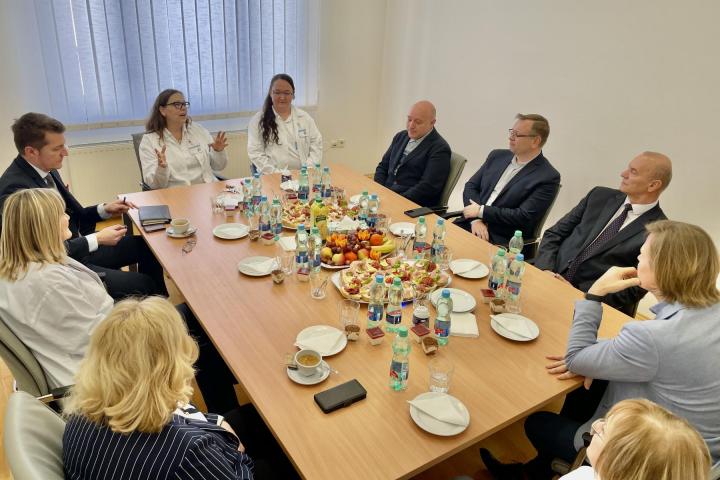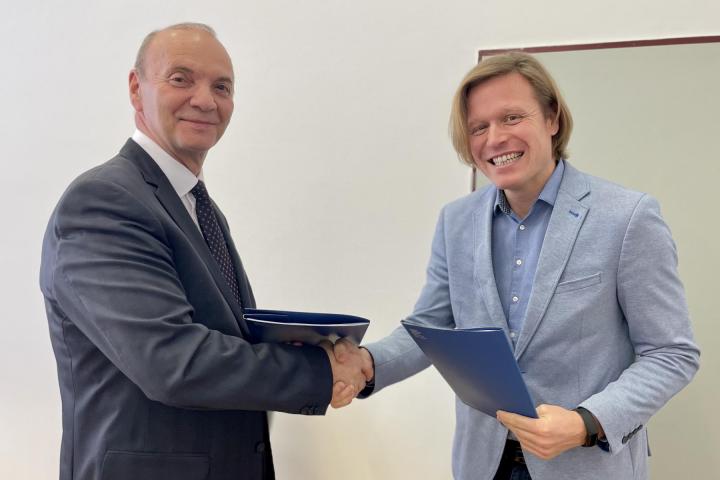
The main vision of the Rehabilitation Clinic CTU FBMI is to effectively combine rehabilitation care with biomedical engineering. "Comprehensive rehabilitation must respond to changes in society and use modern technologies that penetrate all phases of patient care and significantly reduce the time of hospitalization or enable effective treatment in the home environment. Cooperation with experts from FBMI opens up new possibilities in prehabilitation, telerehabilitation and distance therapy," said MUDr. Bc. Petra Sládková, Ph.D., Head of the Rehabilitation Clinic of the Faculty of Medicine and Medical Sciences and CTU FBMI.
Director of the Bulovka University Hospital, Mgr. Jan Kvaček , underlined the main benefit of the clinic "Our hospital strives to be at the forefront of innovation and to provide patients with the highest level of health care. The partnership with the Faculty of Biomedical Engineering of the Czech Technical University brings not only advanced rehabilitation methods, but also new opportunities for development, education and research in this field."
Innovative approach in rehabilitation care
Modern technologies provide patients with the possibility to perform therapy in their home environment and reduce the need for frequent visits to the rehabilitation centre. Telerehabilitation offers online group exercise sessions, monitoring of physical activity through mobile apps, and incorporation of interactive gaming systems into the treatment process.
Another important step is the establishment of two specialised counselling centres - the Onco-Rehabilitation Counselling Centre and the Upper Limb Rehabilitation Counselling Centre, which will offer the use of advanced technologies, including virtual reality. In addition, the clinic plans to set up and equip testing facilities for ergodiagnostics, a specialised diagnostic method aimed at assessing an individual's ability to work. This will make it possible to objectively assess patients' working abilities and determine whether they can perform their profession in the same mode as before their illness. This method will be aimed primarily at cancer and psychiatric patients, who will be helped to return to normal life and work.
Facilities for teaching and research activities
The cooperation between the two institutions is based on several main pillars linking teaching, research and clinical practice. Students of physiotherapy from CTU FBMI regularly visit the clinic as part of theoretical teaching and clinical practice. In the future, students of other non-medical health programmes with a health and social orientation will also be taught here. The clinic will offer them even better facilities in a newly built classroom with a capacity of up to 50 students. This classroom will be equipped with height-adjustable rehabilitation couches and will enable effective practical teaching with real clinical practice conditions. However, collaboration on teaching works both ways. Some of the clinic's professional staff develop their knowledge and skills through postgraduate studies at the FBMI.
Another of the concrete benefits of this link is a pilot project focused on the use of modern technologies borrowed or developed in cooperation with the CTU FBMI, specifically in the care of oncology patients. This initiative is followed by an application to the Ministry of Labour and Social Affairs for the implementation of a project aimed at further strengthening the cooperation between the two departments.
Prof. MUDr. Jozef Rosina, Ph.D., MBA, Dean of Faculty of Biomedical Engineering of CTU added: "I am glad that the long-term cooperation with the Rehabilitation Clinic of the Bulovka University Hospital is gaining a new dimension. The development of new technologies for rehabilitation medicine and the development of telemedicine and the possibilities of artificial intelligence in the field of rehabilitation are an important part of research at our Faculty. The possibility of cooperation with a major clinical department of the Bulovka University Hospital will allow us to direct the scientific and research work of our staff towards the development of technologies that will be most suitable for the treatment process in rehabilitation."
Plans for the future
The clinic is also planning to expand its activities in the field of scientific research, to collaborate on the development of preclinical and clinical applications, testing of modern technologies and selected drugs and medical devices. Thanks to the multidisciplinary composition of the rehabilitation team, another of the clinic's goals is the implementation of professional seminars, certified courses and professional conferences in the Czech Republic and abroad. The long-term goal is to develop new equipment for specific types of diseases with the possibility of individual adaptation, which will provide patients with more effective and targeted rehabilitation care.
